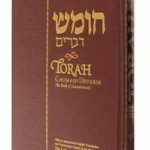A siyyum for Simchat Torah
 The custom is to conclude the study of any religious book with a siyyum which celebrates the achievement and ponders the final section of the book.
The custom is to conclude the study of any religious book with a siyyum which celebrates the achievement and ponders the final section of the book.
This year (indeed it would be appropriate any year) let us celebrate the conclusion of the Five Books of Moses by means of a siyyum on the final verses of D’varim chapter 34.
• The chapter marks the end of the long career of Moses. The next book of Tanach opens with Joshua taking over the leadership. Why did Moses’ own sons not inherit the role? The Midrash explains that Joshua had earned the rank of leader by a lifetime of faithful service. The decision was made by God, showing that political leadership is not hereditary.
• How old was Moses when he died (verse 7)? 120, i.e. 10 x 12, perhaps because each decade of his life was dedicated to the 12 tribes.
• Why (verse 10) is Moses called a prophet? Not because he could predict future events but because he received the Divine message more clearly than anyone else and he conveyed it with passion.
• Why does verse 12 emphasise how strong Moses was? When the people disobeyed the Torah, Moses was mighty and courageous enough to smash the tablets of the covenant because he thought Israel did not deserve them.
• Why (verse 6) does nobody know where Moses is buried? To prevent it becoming a national shrine, and because, as the sages say in the Jerusalem Talmud, the righteous need no monument; their deeds are their memorial.



